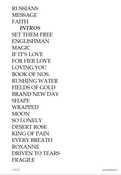
Sting thrills audiences at the tour kickoff in Mannheim with electrifying joy...
In Mannheim, Sting once again demonstrates that he is one of the greatest musicians of our time. His social statements are as broad as the impressive range of his musical abilities.
The concert opens with a message of peace. Sting is known for his clear stance against poverty in the world and for the preservation of nature. Now he also sends a musical message of peace. Sting takes the stage at the SAP Arena in Mannheim with two cellists from Ukraine.
He speaks to the audience in German. This first song is "Eine Geste der Solidarität" (A Gesture of Solidarity). Then they perform his almost 40-year-old hit "Russians" together. The hope is that the recurring line "I hope the Russians love their children too" will ultimately lead to the realization that war can never be a real solution. The hashtag #freeukraine displayed speaks for itself.
After this statement, the band takes the stage and Sting starts off. His energy seems unleashed, like a racehorse that hasn't been out on the track for two years. The rocking energy of "Message in a Bottle" and "If I Ever Lose My Faith in You" is generated by the exuberant joy of playing by Sting and all the band members.
The groovy soul of "If You Love Somebody Set Them Free" permeates the entire body, and the vocal interplay between the audience and Sting during "Englishman in New York" can be heard throughout the hall, despite the masks.
With "If It's Love," Sting moves into the second block of five songs from his current album, "The Bridge." This song is more leisurely, like a leisurely afternoon stroll with cheerful whistling. "For Her Love" is then gripping again, a floating groove with a catchy rhythm.
The tempo picks up again with the driving sound of "Loving You." The rocking guitar sound of "The Book of Numbers" is also impressive. Finally, "Rushing Water" is a true gem. A delight in the classic style of the Police's old hits, spiced with stylistic elements that at times recall the songs of Alan Parsons.
With "Fields Of Gold," the party finally gets underway. The audience joins in, getting more and more carried away. Sting gives the harmonica player a "fingers crossed," as he's supposed to follow in the footsteps of Stevie Wonder, who originally performed this part, on "Brand New Day." No problem, it's effortless. The mood rises, and Sting calls on the audience to "Stand Up," and finally, they're allowed to stand.
"Shape Of My Heart," in this newer version with its groovy soul guise, is a cleverly arranged interplay between Sting and his backing singer. The harbinger of summer is the classic reggae sound of the Police on "Wrapped Around," which simply makes you want to dance. Bob Marley is omnipresent in the next two songs.
First, Sting mixes his "Get Up, Stand Up" with his "Jah" as a primal scream into his hit "Walking On The Moon." The audience consistently responds to every "Yeah" and sings along uninhibitedly. During "So Lonely," "No Woman, No Cry" becomes part of the groove party before the sound explodes with blazing guitar rock.
The final stretch of the concert features several songs that simply give you goosebumps. First, Sting performs "Desert Rose" with a power that makes your whole body tremble. The anthem "Every Breath Your Take" is, as always, enthusiastically celebrated at the end of the main set.
The encore begins with a very special version of "Roxanne." The driving, powerful sound is underscored by the guitarist's strumming of the guitar strings. Sting extends the song, turning it into an extra-long jam session, before exploding at the end with primal vocal power and guitar rock. For "Driven To Tears," he brings in his son Joe Sumner, who had previously provided support as he often did.
The classic finale, as almost always, is "Fragile." This emotion, this palpable fragility in the voice, touches many people in the hall particularly deeply after all the emotional stress of the past two years and the current war in Ukraine. A worthy finale to two hours of live music of the highest caliber.
(c) Regioactive by Erik Winkes


